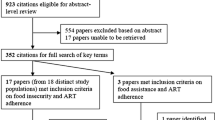Abstract
Food insufficiency is associated with suboptimal HIV treatment outcomes. Less is known about psychosocial correlates of food insufficiency among PLWH. This sample includes 1176 adults initiating antiretroviral therapy at HIV clinics in Ethiopia. Logistic regression modeled the association of psychological distress, social support, and HIV-related stigma with food insufficiency. Among respondents, 21.4% reported frequent food insufficiency. Psychological distress [adjusted odds ratio (aOR) 2.61 (95% CI 1.79, 3.82)], low social support [aOR 2.20 (95% CI 1.57, 3.09)] and enacted stigma [aOR 1.69 (95% CI 1.26, 2.25)] were independently associated with food insufficiency. Food insufficiency interventions should address its accompanying psychosocial context.
Similar content being viewed by others
References
Tesfaye M, Kaestel P, Olsen MF, et al. Food insecurity, mental health and quality of life among people living with HIV commencing antiretroviral treatment in Ethiopia: a cross-sectional study. Health Qual Life Outcomes. 2016;14:37.
Ethiopian Health Nutrition Research Institute (EHNRI). Nutrition baseline survey report for the national nutrition program of Ethiopia. Addis Ababa: EHNRI; 2009.
Koss CA, Natureeba P, Nyafwono D, et al. Brief report: food insufficiency is associated with lack of sustained viral suppression among HIV-infected pregnant and breastfeeding ugandan women. JAIDS. 2016;71(3):310–5.
Aibibula W, Cox J, Hamelin A, Mamiya H, Klein MB, Brassard P. Food insecurity and low CD4 count among HIV-infected people: a systematic review and meta-analysis. AIDS Care. 2016;28(12):1577–85.
Tsai AC, Bangsberg DR, Frongillo EA, et al. Food insecurity, depression and the modifying role of social support among people living with HIV/AIDS in rural Uganda. Soc Sci Med. 2012;74(12):2012–9.
Tomori C, Kennedy CE, Brahmbhatt H, et al. Barriers and facilitators of retention in HIV care and treatment services in Iringa, Tanzania: the importance of socioeconomic and sociocultural factors. AIDS Care. 2014;26(7):907–13.
Nash D, Tymejczyk O, Gadisa T, et al. Factors associated with initiation of antiretroviral therapy in the advanced stages of HIV infection in six Ethiopian HIV clinics, 2012 to 2013. J Int AIDS Soc. 2016;19:20637.
Rovira D, Schwefel R, Leidl J, Drummond MF. Economic aspects of AIDS and HIV infection. Berlin: Springer; 1990.
Holzemer WL, Uys LR, Chirwa ML, et al. Validation of the HIV/AIDS stigma Instrument—PLWA (HASI-P). AIDS Care. 2007;19(8):1002–12.
Palermo T, Rawat R, Weiser SD, Kadiyala S. Food access and diet quality are associated with quality of life outcomes among HIV-infected individuals in Uganda. PLoS ONE. 2013;8(4):e62353.
Aibibula W, Cox J, Hamelin A, et al. Impact of food insecurity on depressive symptoms among HIV–HCV co-infected people. AIDS Behav. 2017;21(12):3464–72.
Maluccio JA, Palermo T, Kadiyala S, Rawat R. Improving health-related quality of life among people living with HIV: results from an impact evaluation of a food assistance program in Uganda. PLoS ONE. 2015;10(8):e0135879.
Tsai AC, Bangsberg DR, Emenyonu N, Senkungu JK, Martin JN, Weiser SD. The social context of food insecurity among persons living with HIV/AIDS in rural Uganda. Soc Sci Med. 2011;73(12):1717–24.
Acknowledgements
The authors gratefully acknowledge the study participants and clinic and research staff who collected the data.
Funding
The project was supported by a research grant from the US National Institute of Mental Health (R01MH089831). Dr. Parcesepe was also supported by Award Number T32 MH019139 (Principal Investigator, Theodorus Sandfort, PhD) from the National Institute of Mental Health. All the clinics included in this study received support from ICAP at Columbia University through funding from the President’s Emergency Plan for AIDS Relief.
Author information
Authors and Affiliations
Corresponding author
Ethics declarations
Conflict of interest
The authors declare that they have no conflict of interest.
Ethical Approval
The study was approved by the Institutional Review Boards of the Oromia Regional Health Bureau, Columbia University Medical Center and the City University of New York. All procedures performed in this study were in accordance with the ethical standards of the Institutional Review Boards of these institutions and with the 1964 Helsinki Declaration and its later amendments or comparable ethical standards.
Additional information
Publisher's Note
Springer Nature remains neutral with regard to jurisdictional claims in published maps and institutional affiliations.
Rights and permissions
About this article
Cite this article
DiLorenzo, M.A., Parcesepe, A., Tymejczyk, O. et al. Psychosocial Factors Associated with Food Insufficiency Among People Living with HIV/AIDS (PLWH) Initiating ART in Ethiopia. AIDS Behav 23, 3052–3057 (2019). https://doi.org/10.1007/s10461-019-02505-9
Published:
Issue Date:
DOI: https://doi.org/10.1007/s10461-019-02505-9




